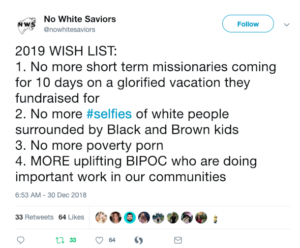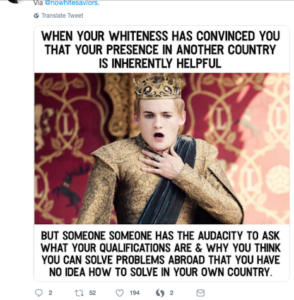 I’m on a Facebook group for humanitarian workers that work in countries other than their own. It’s an invitation-only group, so I’m not going to say the name.
I’m on a Facebook group for humanitarian workers that work in countries other than their own. It’s an invitation-only group, so I’m not going to say the name.
Over the last few weeks, women have posted about experiencing sexual harassment from co-workers and, in one case, a representative of a donor agency, and some have asked how to deal with it.
After sharing some information about her latest experience, one woman asked for specific advice:
What implication will it have to report, how will my colleagues see me after I report, my reputation is in-line, what implication will it bring to my career in this field.
The reality is that NO ONE can answer her questions, because there is no way to know unless someone else has reported before at that specific organization, with exactly the same staff, and can share what happened in their case. Every organization is different. No matter what their policies regarding sexual harassment, it is possible her colleagues will support her and it is possible they won’t. It is possible it will affect her career negatively if she reports and it is possible it won’t.
Of course, there are responses like this to accounts of sexual harassment:
I’m a man and I’m telling you to stand up for such a$$holes.
I’m not sure why men don’t understand that there are consequences for “standing up”: she could be fired for something seemingly unrelated to the harassment, her job could suddenly be eliminated, she could stop being invited to meetings and stop receiving important internal memos, isolating her to the point of being forced to quit, supervisors could share that she’s a “problem” and she could find herself without references and without a job.
Here are responses from women on the Facebook group about how they handled sexual harassment by co-workers or representatives from partner organizations or donor organizations, or what their own fears have been about reporting such:
My experience is that if you stand for yourself, you are labeled as a prude and not funny and/or the person that is so deeply offended that no future communication seems possible.
The only thing that ever worked for me was to find a male “ally” that would intervene in such a situation. Sad but true.
I had a similar situation (inappropriate comments) inside my own organisation: he was the boss of my boss. I never confronted him directly but I told my boss and my colleagues, and they never left me alone with him again.
Sometimes, responding angrily, in the moment, pisses off predators even more and they retaliate by being even more disgusting or threatening.
The problem here is the impact our decision has on our organizations or our future careers. And while most often men accused/investigated for such things are just free to go, with no consequences, women’s career or their organizations’ future is at stake. And that’s unfair. I should not be forced to chose between my dignity, my beneficiaries/colleagues and justice. I should not have to risk more than him. But it is true. And tbh, if you ask me if I chose to speak up and risk that my organization will not be able to support people in need and my colleagues will lose their jobs or my dignity, I will just shut up and smile, both while feeling extremely helpless and frustrated. Fair? Not. Probable? Very.
This is the reality of so many professional women, not just those working in humanitarian assignments abroad: it’s the reality for journalists, for professors, for doctors, for nurses, for women working in manufacturing or food service or retail.
When I was in this position myself – being harassed by a male co-worker – I reported it to the UN HR field office where I worked – and was told by the UN HR representative, “Working in the field is really difficult, and if you aren’t up for these challenges, perhaps you should leave when your contract ends, if not before.” I was stunned. I wasn’t ready to give up the job – and I felt like I would also be giving up my entire career. So, instead, I went to the local staff HR counterpart, someone who was from the country where I was working. I told him what was happening, and told him to never, ever put me in the same car with the perpetrator on field visits – to put no women in his car at all. We had a long, honest talk about it and he had my back – he made sure this guy never got opportunities to be alone with any female staff in cars. I talked to all other women in the office and we agreed to watch out for each other, to never leave anyone alone with this person. I will always be angry that that UN HR person wouldn’t support me – but I also know my career would have been completely derailed if I had officially reported the incident, and I wasn’t ready to lose my career.
This is my advice for a woman experiencing sexual harassment on the job in humanitarian work, and I hope it’s helpful to other women in other professions as well. It’s what I wish I had done:
Remember that your safety and health are most important and you need to do what is best for you.
Email the details of exactly what happened – exactly what was said, where and when – regarding the instances of sexual harassment to a trusted colleague. That doesn’t have to be a colleague at the same organization, but it does need to be someone you trust NOT to forward the email unless and if you ask them to, and will keep the email indefinitely. This will give you a written record of what happened and proof that you told someone close the actual date of what happened. In your account, focus on what was said and done. Don’t just say, “He said sexual things that made me uncomfortable” but, rather, EXACTLY what the person said. Don’t say “He touched me sexually” but, rather, “He put his hand on…” Keep a copy of this email or emails on a computer of your own as well. If you choose not to report now, but to do so later, this email/these emails will be crucial.
Think about ways to keep yourself safe while you are waiting to decide whether or not to report. For instance, do not meet alone with the perpetrator: always take someone with you. Refuse to be in a car alone with the person. If the person comes to your office, insist that the door stay open. If you think it would be helpful, tell trusted co-workers to help you in never meeting along with the person, never being next to the person in a car, etc. Don’t be surprised if, in talking with other women, you find that they have similar stories of being harassed.
I suggest you go to the person that you are supposed to report to at your organization regarding sexual harassment. This is probably someone in human resources. You may want to ask a trusted co-worker to go with you and sit quietly while you speak, to be a witness to what happens. At this meeting, tell exactly what happened, without saying the name of the perpetrator’s name but with as many details as possible. Say that you are not going to say the name of the person at this point, and say why:
I am worried about giving you further information because I worry about my career and how I will be treated if I fully disclose. I would like to know what exactly will happen when I give you the name of this person. How will you investigate? How will this be documented? What other staff members and office will know about the investigation? I am not asking if the person will be fired or reprimanded – I am asking only for how these kinds of cases proceed by office policy, so I can know whether or not I should give further details.
If you feel comfortable proceeding based on the answers you get, proceed with full reporting and give the perpetrator’s name. If you don’t feel comfortable, say, “I don’t feel comfortable saying more because I’m not getting clear answers” or “I am going to take 24 hours to consider your answers.” No matter what happens at the meeting, you need to write an email of followup with the person you met with, copying the person who was there as a witness, saying, “Thank you for meeting with me on such-and-such date. In our meeting, we agreed that…” and then recount exactly what was said in that meeting, exactly what the answers were to the questions you asked, so that the person cannot later try to say that he or she did or didn’t say something.
Also, rehearse comments to make if the harassment happens again. You want to be able to say these clearly, with a somewhat raised voice so that anyone nearby can hear you, and rehearsing these statements can help you later, in the moment:
“What did you just say to me? Please repeat what you just said to me.”
“I don’t think this is an appropriate comment/conversation and I don’t want to hear it again.”
“That comment makes me uncomfortable and you are not to talk to me that way again.”
Then leave the space immediately, if possible. If you are next to the person in a room, move. If the person walks into a room with you and closes the door, walk over and open it, with no explanation, until someone else enters the room. If you are in a car and the security situation allows it, ask the driver to stop the car, insist if necessary, then exchange seats with a man in the vehicle: “I am going to have to exchange seats with you immediately. Thank you.”
And continue to document any inappropriate behavior or references to such.
Also see:
 The pushback against voluntourism – where Westerners pay large amounts of money to go to another country for a few days or weeks and engage in an activity they believe is helping people in some way with just a few hours of volunteering – seems to be getting more intense, judging from what I’m seeing online. I’m now not the only one posting about the dark side of voluntourism on sites like Quora and Reddit – which is so different from 10 years ago, when I felt like the lone voice on sites like YahooAnswers, and on my own web site, begging people not to support voluntourism.
The pushback against voluntourism – where Westerners pay large amounts of money to go to another country for a few days or weeks and engage in an activity they believe is helping people in some way with just a few hours of volunteering – seems to be getting more intense, judging from what I’m seeing online. I’m now not the only one posting about the dark side of voluntourism on sites like Quora and Reddit – which is so different from 10 years ago, when I felt like the lone voice on sites like YahooAnswers, and on my own web site, begging people not to support voluntourism.




 I thought it would be fun to start the New Year off with some humor.
I thought it would be fun to start the New Year off with some humor. Katie Meyler of the USA wanted to save girls in Liberia from sexual exploitation, to educate them, empower them, keep them safe. She founded a charity called More Than Me and quickly raised more than $8 million for her efforts. The first More Than Me project multiplied quickly to 19 schools teaching 4,000 students. When the Liberian president, who had won a Nobel Peace Prize for her fight for women’s safety, was asked what she wanted from those keen to help her country, she answered, “To expand Katie Meyler’s initiative to as many communities as possible.” Meyler rubbed shoulders with Warren Buffett, Bill Gates and Oprah Winfrey, and even get invited to the Obama White House.
Katie Meyler of the USA wanted to save girls in Liberia from sexual exploitation, to educate them, empower them, keep them safe. She founded a charity called More Than Me and quickly raised more than $8 million for her efforts. The first More Than Me project multiplied quickly to 19 schools teaching 4,000 students. When the Liberian president, who had won a Nobel Peace Prize for her fight for women’s safety, was asked what she wanted from those keen to help her country, she answered, “To expand Katie Meyler’s initiative to as many communities as possible.” Meyler rubbed shoulders with Warren Buffett, Bill Gates and Oprah Winfrey, and even get invited to the Obama White House. I’m on a Facebook group for humanitarian workers that work in countries other than their own. It’s an invitation-only group, so I’m not going to say the name.
I’m on a Facebook group for humanitarian workers that work in countries other than their own. It’s an invitation-only group, so I’m not going to say the name.
